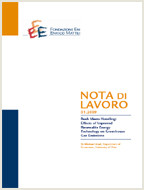Time Scale Externalities and the Management of Renewable Resources

Data
03.04.2015
03.04.2015
Autori
Giannis Vardas, Anastasios Xepapadeas (Athens University of Economic and Business)
Codice JEL
D81, Q20
D81, Q20
Parole chiave:
Optimal Resource Harvesting, Fast Slow Dynamics, Singular Perturbation, Regulation, Open Loop, Closed Loop
Optimal Resource Harvesting, Fast Slow Dynamics, Singular Perturbation, Regulation, Open Loop, Closed Loop
Publisher
Climate Change and Sustainable Development
Climate Change and Sustainable Development
Editor
Carlo Carraro
Carlo Carraro
The evolution of renewable resources is characterized in many cases by different time scales where some state variables such as biomass, may evolve relatively faster than other state variables such as carrying capacity. Ignoring this time scale separation means that a slowly changing variable is treated as constant over time. Management rules designed without accounting for time scale separation will result in inefficiencies in resource management. We call this inefficiency time scale externality and we analyze renewable resource harvesting when carrying capacity evolves slowly, either in response to exogenous forcing or in response to emissions generated by the industrial sector of the economy. We study cooperative and non-cooperative solutions under time scale separation. Using singular perturbation reduction methods (Fenichel 1979), we examine the role of different time scales in environmental management and the potential errors in optimal regulation when time scale separation is ignored.
***
Suggested citation: Vardas, G., A. Xepapadeas, (2015), ‘Time Scale Externalities and the Management of Renewable Resources’, Nota di Lavoro 27.2015, Milan, Italy: Fondazione Eni Enrico Mattei
